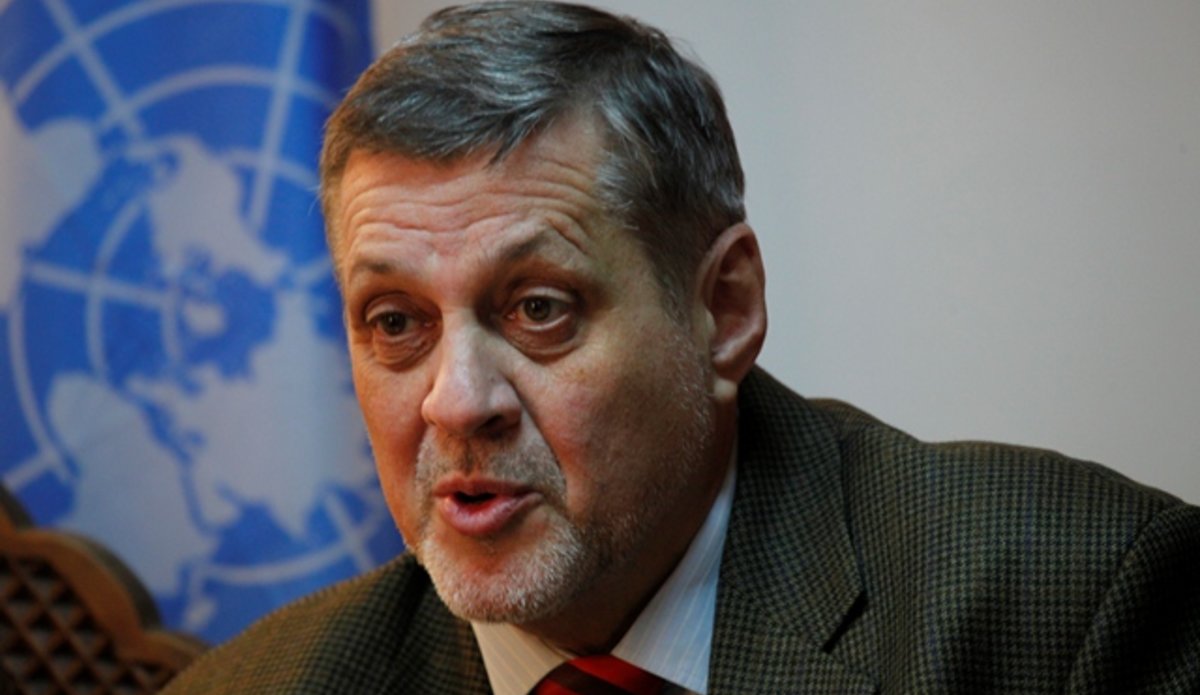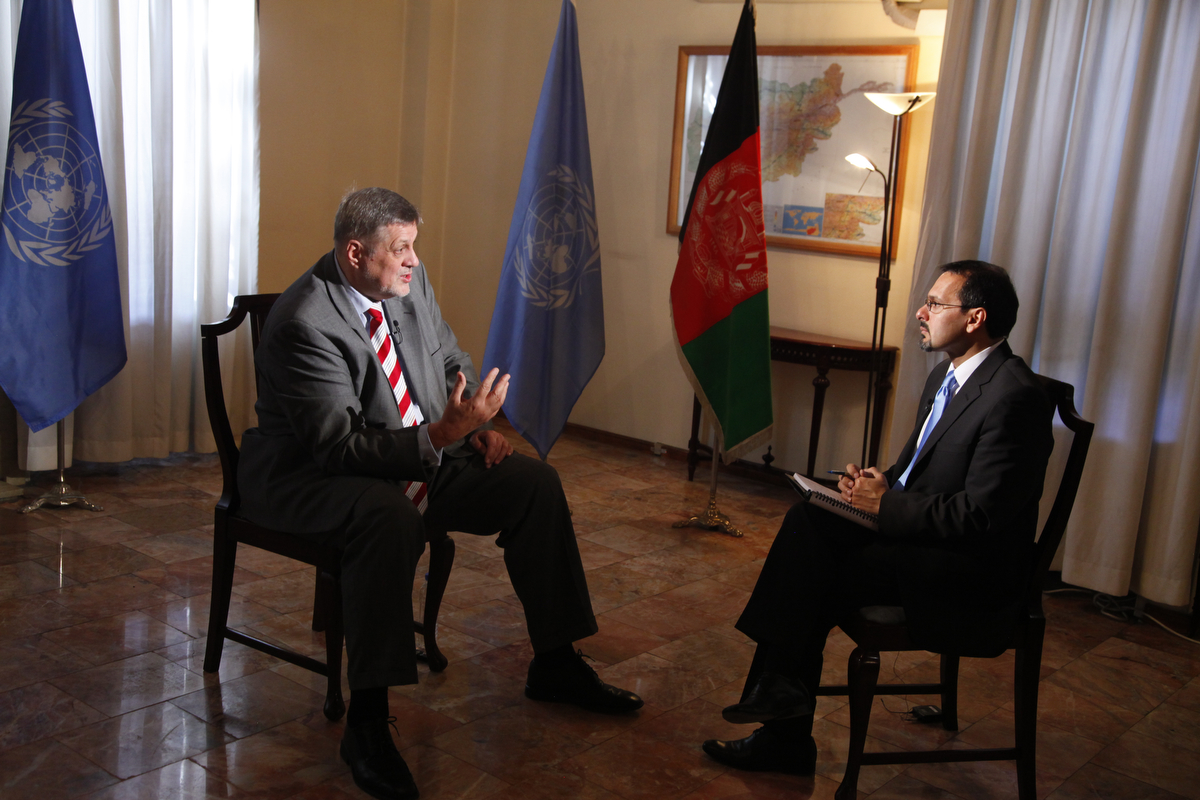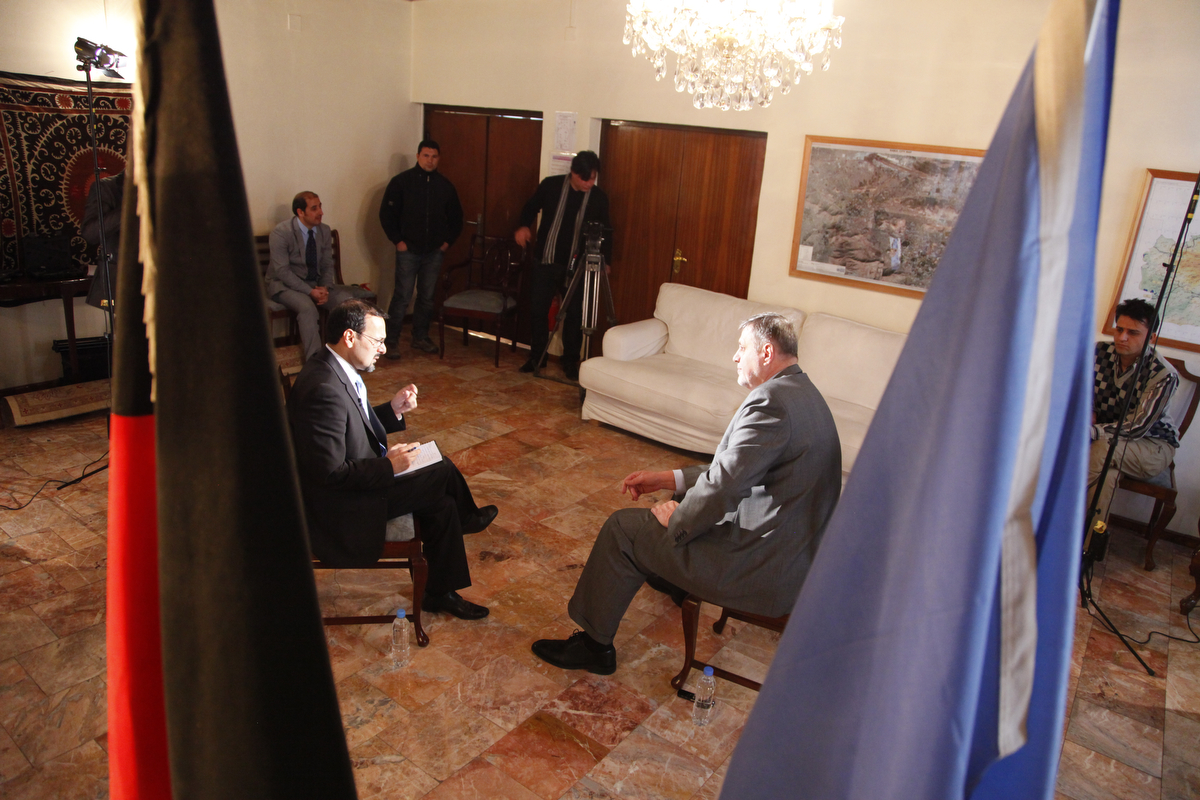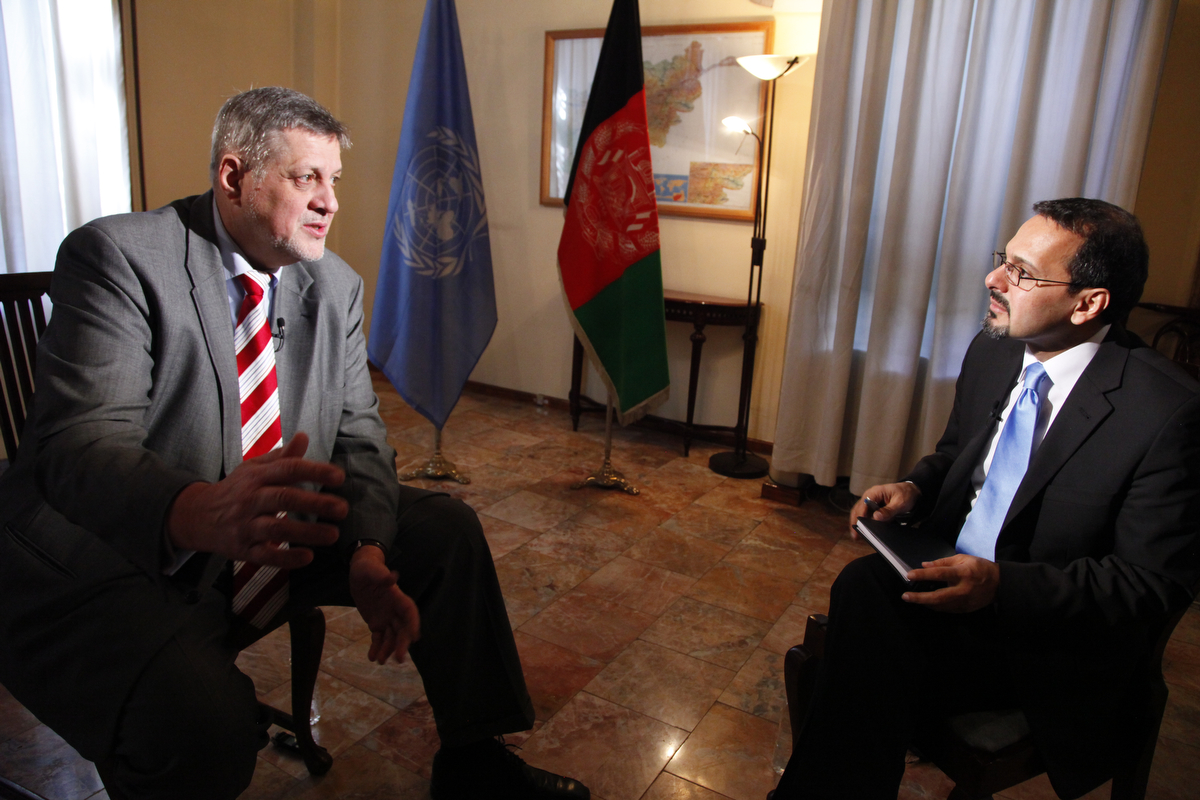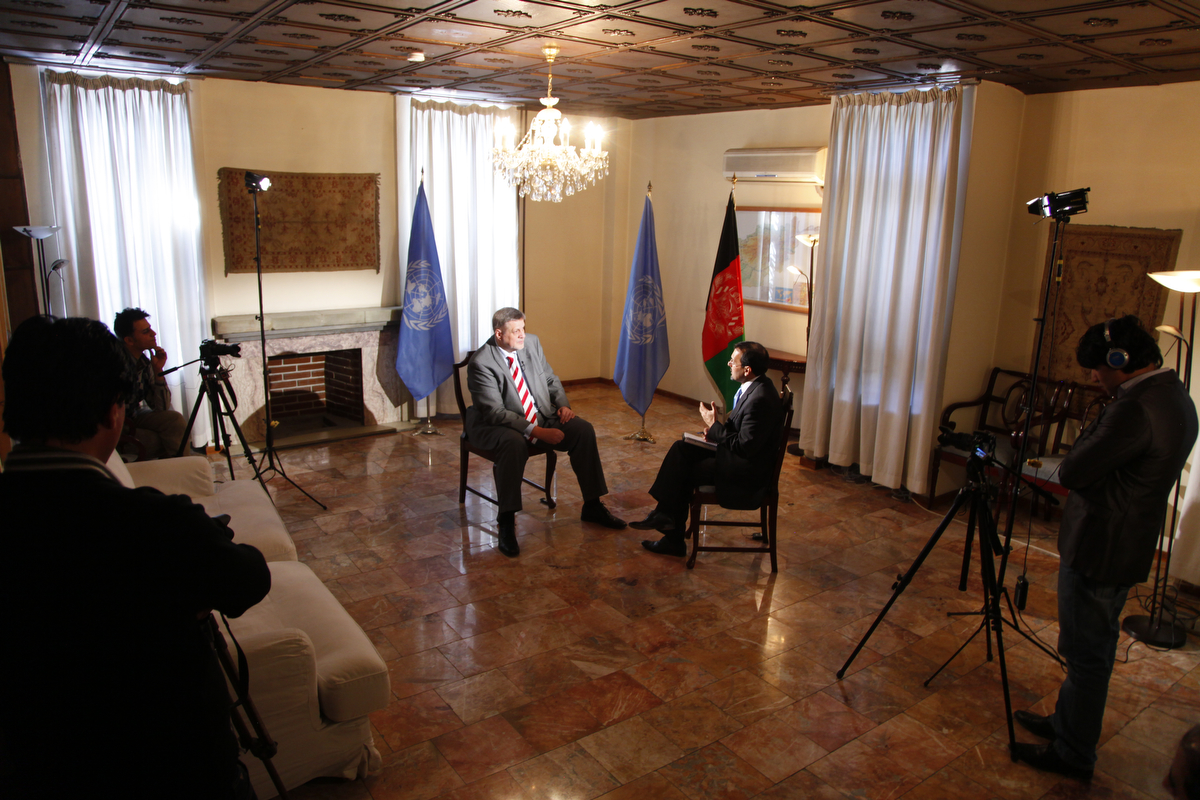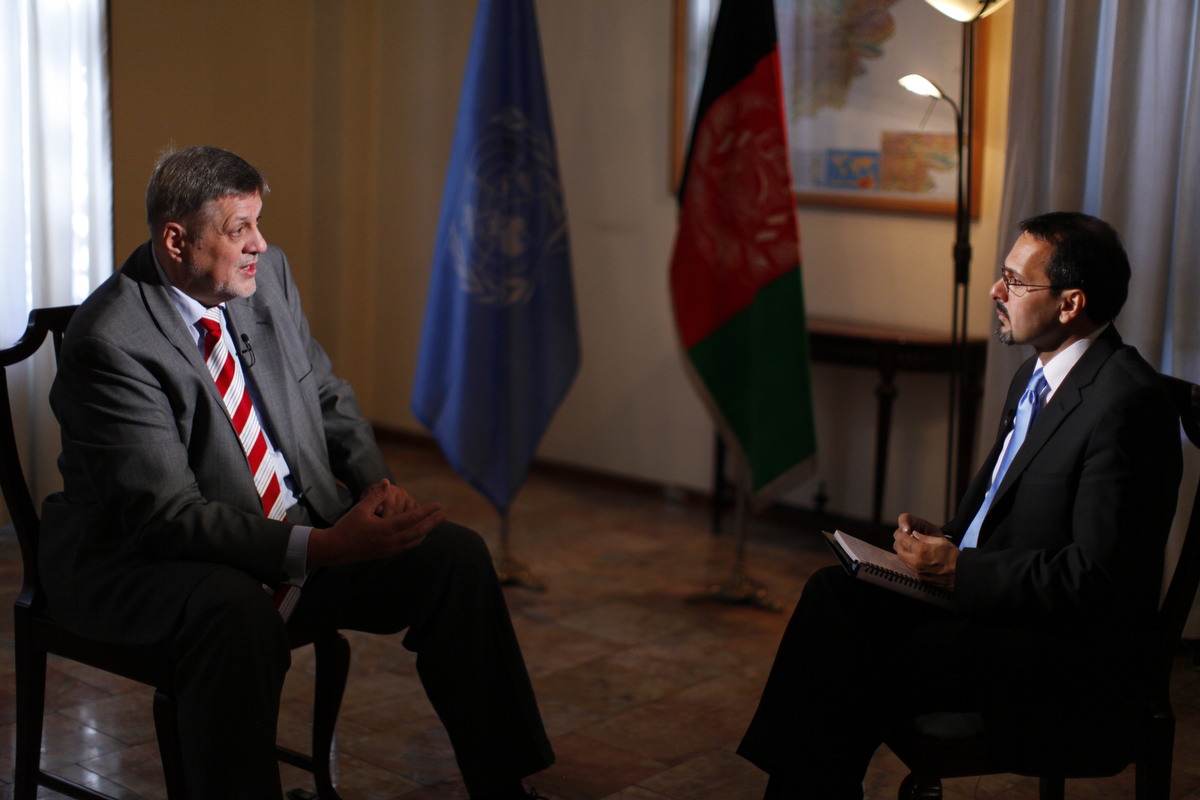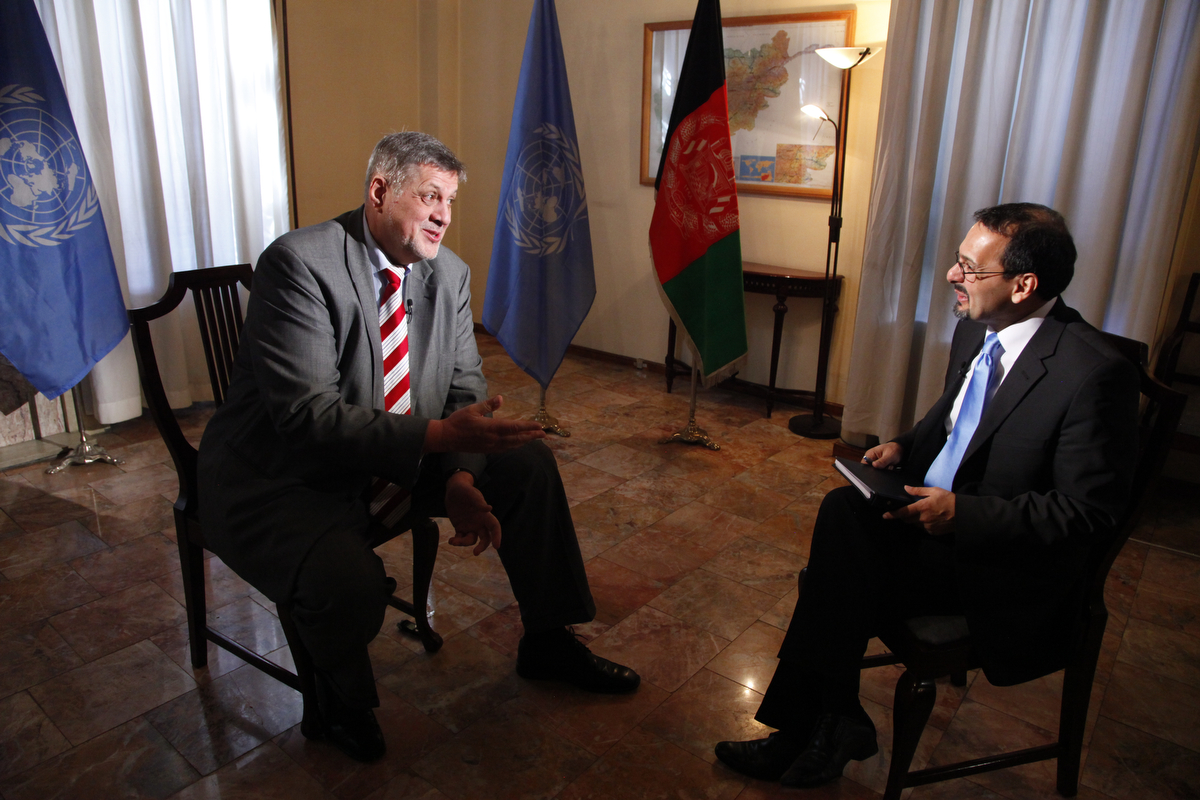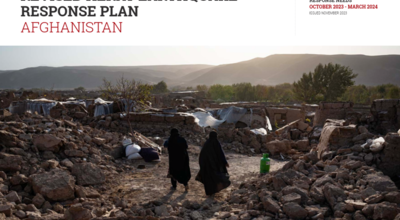Afghan election 'a new chapter' for Afghanistan – UN special envoy
KABUL - The top United Nations official in Afghanistan described the upcoming Presidential and Provincial Council elections, slated for 5 April 2014, as “a new chapter in the life of the country,” involving not only a political transition but also a major step in developing the democratic system and bringing more stability and predictability to the nation.
“With all the challenges, all the risks that are there, I see this as a very positive development,” said the UN Secretary-General’s Special Representative and the head of the UN Assistance Mission in Afghanistan (UNAMA), Ján Kubiš in an exclusive hour-long interview with a private television channel, Tolo TV, broadcast on Friday evening [the interview was pre-recorded on 10 February 2014].
The head of UNAMA noted that he was “reasonably satisfied” with the preparations for the elections and pointed to a robust legal framework and the independent election institutions which were developed and created on the basis of the “clear laws” of the country.
Mr. Kubiš said that it was “very encouraging to see the first elections that are fully in the hands of Afghans. Afghanistan is doing well.”
He underlined however the need to make sure that all electoral processes are “as clear as possible, as correct as possible, as inclusive as possible,” and spoke of the absolute necessity for the preventive measures to counter any fraudulent activities which could spoil the elections and undermine their credibility and broad acceptance.
The UN Envoy said that he did anticipate “deficiencies and problems” during the election process.
“We cannot expect perfect elections. First of all, in no country in the world you will find perfect election. There is always a problem here and there… But I see a very strong drive and very good quality preparations for reasonably good elections. That should be inclusive, that should be representative, that should be guided by the law, by clear action plans provided by the commissioners, clear regulations and rules,” he said.
“At this point of time, we detect a very strong will on the side of the people, majority of the people [that they] would like to go and vote. They know how critically important the election is for the future of the country, for future stability and unity of the country,” observed Mr. Kubiš.
When asked about the UN role in election observation, the UN Envoy said that “formally, we do not have that role.” He specifically stressed that the elections are an “Afghan-led, Afghan-managed” process and that the role of the United Nations and UNAMA is to support Afghan authorities and the independent electoral bodies by advising on various election related matters, and by providing capacity-building and technical assistance.
He added at the same time: “But, we do monitor what is happening here [in the election processes], and in case we have concerns or we hear concerns from our Afghan interlocutors, we discretely but openly raise these kinds of concerns.”
When asked if he had confidence that the Afghan government would not be interfering in the elections, the UN Special Envoy said that he took seriously public and private assurances given by the President.
“So far, I am taking very seriously what we see in his [President Karzai’s] public statements and discussions with the candidates, with the people and with ourselves that there will be no interference in the process,” he said.
As to the United Nations, “we made it very clear: we will not interfere in what is the business of the independent election institutions and authorities,” added the UN Envoy.
The Special-Representative said that “the success and satisfaction with the results of elections are depended on the credibility of the process and preparations.” “Therefore, it would be so important that the election institutions were working with the candidates, bringing to their attention all the particulars of the election related programmes and activities, starting with registration, with procurement and security arrangements.”
“I am very happy, for example, that the Independent Election Commission [IEC] has organized several meetings with the candidates and intends to continue this to discuss security of the elections together with the Ministry of Interior,” added Mr. Kubiš.
In response to a question relating to the budgetary problems the Independent Election Complaints Commission (IECC) is reportedly facing in the provinces, the Special Representative said that the IECC does have a budget provided by the Government and added that this body “is an independent Afghan institution. It is the duty and responsibility of the Afghan Government to provide support, not of the international community, in the first place, but we [United Nations and international community] complement.”
“We have provided money, technical advice; we have provided logistics, material support [but], as I detected, there are some misinterpretation of what has been available, of what has been provided. Very soon we will bring more clarity to this because I believe that people should know, be aware that indeed the international community has been in a very strong way supporting the work of IECC,” he said.
In this context, Mr. Kubiš made the point that the IECC should also make use of what is available elsewhere. “We know that the IEC – the counterpart commission – although these are two independent bodies, they should work in a way separately from each other, as far as topics and substance is concerned, but they should and could assist each other in delivery of their mandates. And I am very much encouraged that both bodies are now negotiating a memorandum of understanding that would enable them to work together.”
The head of UNAMA referred further to the importance of the principle of inclusiveness to the credibility of elections.
“You would like to have a new Government; you will have a new President with new team that is supported by the majority of the people that is supported by all … by all groups across the board. That would work for the unity of the country. For that, you need to have a representative and inclusive elections as well. So far, I think that all the efforts are being done to have this representative and inclusive elections. That will give the chance to the majority of the people in the country to cast their vote, including in the areas that might be difficult and will remain [so] from the security point of view,” he said.
Acknowledging that Afghanistan faces major security challenges, the Special Envoy believed that “everything will be done to ensure that the polling stations will open and [be] accessible to the people. Everything will be done to ensure that the security environment, to the extent possible, will be there, but we know how the situation is.”
Mr. Kubiš expressed confidence in the ability of the Afghan National Security Forces (ANSF) to ensure “the right possible enabling environment for having the elections throughout the country.”
In response to a question relating to the role of the International Security Assistance Force (ISAF) in the upcoming elections, the head of UNAMA said that although he could not speak for the international forces, his understanding was that ISAF was planning to stay in Afghanistan through the elections, including during the second round, should it be required.
“They [ISAF] can provide assistance in assessing the security situation, helping the Afghan authorities, Ministry of Defense, Ministry of Interior, and, yes, [delivering] some better information about the situation to enable the Afghan authorities to better plan for the concrete security environment. They are ready to provide logistics support, if needed. … Again, this is the responsibility of Afghans, Ministry of Interior, Ministry of Defense, but they [ISAF] are here,” he said.
Mr. Kubiš called on the Taliban to stop all actions aimed at disrupting the electoral process and appealed to their Afghan identity. “My message [to the Taliban]: directly or indirectly, allow the people to vote -- this is their right. These are your people [and] this is your country as well. So, give them the chance.”… “My second appeal [to them]: allow also those, not only those that will vote, but the candidates that campaign, election workers to be able to work, to adjudicate, [electoral] officials … to work, allow them to deliver,” he said.
At another point in the interview, Mr. Kubiš appealed to the Taliban to “stop killing the civilians” and “behave according to the international laws, including international humanitarian law.” “For me, what is important is that they will start working, start acting in such a way that would correlate with the wishes of the Afghan people, the wishes [that] are clear: security, peace, justice, protection of the lives of the people, not acting against the lives of the people,” the UN Special Representative said.
In reference to the question relating to the “peace talks” with the Taliban, Mr. Kubiš noted: “It is not the international community; it is Afghanistan and Afghans that are talking about the need for peace and reconciliation, on terms that are clearly defined, with expectations that are clearly defined as well.”
“The country needs peace and reconciliation on certain conditions and the international community here will be ready to assist, but again, based on certain parameters and conditions … What is important is that it should be a process of Afghans talking to Afghans, assisted and facilitated by the international community,” said the Special Envoy.
On the question relating to the level of preparedness on the part of the Afghan authorities and electoral bodies for the potential second round of elections, the head of UNAMA said that it was not yet clear if the run-off will be needed. But should it be required, he was assured by the IEC officials that “they [Afghan election bodies] will be ready and prepared in case of need” to support the second round of polls.
He added that it was “the responsibility of the government, of the state to provide support to their independent electoral institutions, because otherwise they would not be fully independent … and [hinge] only on the money coming from abroad.”
As for the United Nations and international community’s support, “I can tell you that the international community, through the so called UNDP ELECT II project, …has [already] budgeted, in case of need, to complement the government budget for the second round of the election and I can even add that the budget of the UNDP ELECT is there already, and approved by the donors according to 100 per cent of the requirements, for the [2015] parliamentary elections,” said Mr. Kubiš.
When asked about the role of Pakistan in the peace process, the Special-Representative said that the with the beginning of the term of Prime Minister Nawaz Sharif, there was “a strong political will to address all the questions and to come and help [find] all the solutions that could gradually bring peace, stability and security to Afghanistan and to the region.” He stressed that peace, stability and security in Afghanistan is an essential prerequisite for a stable region.
To another query about the Bilateral Security Agreement (BSA), the UN Envoy said that it was a bilateral matter between Afghanistan and the United States; however he termed it as an important element in shaping the environment in the country.
“We understand very well that the environment in Afghanistan would be different with Bilateral Security Agreement as a trigger for continuous engagement of not only the United States, but [of] many other countries, some donors of Afghanistan for days to come, for their lasting commitment and for their lasting support for the Afghan National Security Forces,” said the UN Special Envoy.
H added however that “without BSA, it doesn’t mean that the international community will disappear, but the degree of support will be different, the focus of the support will be different and definitely it will not be in such a quantity as, in my opinion, needed for the needs of Afghanistan.”
When asked about the future role of UNAMA, the Special-Representative said: “Let’s put it like this; it is a year of transition, but our partnership will not transition; our partnership is lasting.”
“We have been operating here for decades [at the invitation of the Government of Afghanistan], and we assume we will be asked to continue our operations and support Afghanistan for many years to come in many areas, [including] education, health care, agriculture, women’s rights,” said Mr. Kubiš.
Another part of UNAMA’s mandate, he added is “to provide good offices and facilitation and continue steps and other measures to facilitate peace and reconciliation if that would be the wishes of the Afghans.”
“We are here [in Afghanistan], strongly engaged and will remain strongly engaged also in the future,” concluded the Secretary-General’s Special Representative.
 UN
UN
